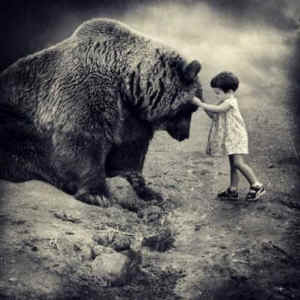“I hope she always looks at herself like that … “ This is my friend’s wish for her four-year-old daughter. Her photo shows her daughter looking in the mirror, admiring her new French braid, and she’s simply ecstatic with herself.
We all used to look in the mirror like that. When was the last time you looked at yourself in the mirror and were completely satisfied, even ecstatic, with the woman looking back?
What happened?
What happened is culture, family, church, school, patriarchy. We’ve been told so many lies about women’s worth – our bodies, our voices, our places. We absorb them from birth, if not before. They’re in the air we breathe.
I spent three days last week in a quarterly retreat with 65 other mostly women entrepreneurs. We were asked to reflect on our biggest obstacle. Hands down the biggest obstacle was that we were “playing small.”
Why? Because we’re afraid that if we go big, get visible, and say exactly what we mean, we won’t be safe. Here’s what I wrote: “I believe that the real me is unlovable. So I have to send out fake me to fool everyone with my perfect façade. Staying small and fuzzy keeps me safe, and I have to feel safe at all times.”
I know that none of this is true. Yet my default pattern when I’m about to say something that I think someone might not like is to freak out and silence myself in advance. I default to “I have to prove that I’m lovable. And being lovable means no one will ever get mad at me and everything will always go smoothly.”
Ownership of ourselves comes after awareness of our patterns. I’m noticing this pattern, finally, and dismantling the thoughts that make me suffer. Because they’re lies.
You heal this oh-so-painful pattern by gradually, one-by-one, relieving yourself of the weight of those lies. Your belief in your belovedness is down there, underneath all the garbage. Beloved shiny you, the you who looks in the mirror ecstatically, will rise up, expand, and gradually take her rightful place as you lift off the garbage piece by piece.
How to lift off the garbage? Here are a few suggestions, in order of time commitment required.
High Five Habit: Basically all you do here is look yourself in the mirror and give yourself a high-five. For more, check out Kara’s Unf*ck Your Brain episode with Mel Robbins.
RAIN: Dr. Tara Brach’s four-step process for becoming aware of what’s going on with us and giving ourselves kind regard.
Awareness Wheel: A simple tool for self-awareness.
Thought Work: Dismantle those lies through gentle, self-compassionate inquiry.
And finally, find a photo of yourself as a child, frame it nicely if you want, and put it where you’ll see it all the time. Ask yourself if that kid is unworthy. Does she need to prove her belovedness? Would you let anyone else tell her she’s not okay just as she is?
Our habits of unworthiness are based on false beliefs.
There is no lasting safety in playing small.
There is no true joy in smooshing ourselves into little appropriate boxes.
Making our belovedness dependent on how others treat us only leaves us bereft of our own kindness and compassionate self-regard.
We’re still the beautiful beings we were when we were babies, toddlers, and four-year-olds, before we started to believe the hurtful lies. Beloved, your belovedness is a given. Your belovedness hasn’t gone anywhere. Your belovedness is within you, waiting for you to remember.
Who do you think you are? How do you treat yourself? These are ultimately theological questions, deeply related to our conceptions of Being and our place in the cosmos.
Want to go deeper? Contact me for a free no-strings-attached conversation.
PS. Happy holidays and happy New Year! I’ll see you in January, beloveds.
Photo Credit: Melissa Askew on Unsplash


